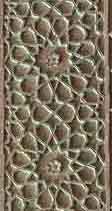FURTHER
RESOURCES:
ONLINE
BOOKS:
*Sugate Bose and
Ayesha
Jalal. Modern
South Asia: History, Culture, Political Economy.
New York:
Routledge,
1998: online
through NetLibrary. Within their system, here
is the exact
location.
*Carl Ernst, Eternal
Garden:
Mysticism,
History, and Politics at a South Asian Sufi
Center. Albany: SUNY
Press,
1992: online
through NetLibrary. Within their system, here
is the exact
location.
*Barbara Daly
Metcalf, Making
Muslim
Space in North America and Europe. Berkeley:
Univ. of California
Press,
1996: Univ.
of California Press. Also online
through NetLibrary. Once within their system,
you can go to the exact
location. (Unfortunately this is not currently
available to CU
users,
but I plan to change this.)
ONLINE
ARTICLES:
*William R.
Dalrymple, "The Real
Islam," Time (Asia) 164,4-5 (July 26,
2004): on
the Time website (with pictures); on
the CU website (better for printing out).
*An overview by
Romila
Thapar on the
Hindutva movement: on
the South Asia Citizens Web site; this site is
valuable and you
might
also want its home
page.
*Irfan Habib, "History
and
Interpretation:
Communalism and Problems of Historiography in
India," in Frontline
14,16 (Aug. 9-22, 1997): on
the Frontline site.
*Mushirul Hasan, "Adjustment
and
Accommodation:
Indian Muslims After Partition," in Social
Scientist
18, 207-8 (Aug.-Sep. 1990), pp. 48-65: online
at DSAL.
*Robert D. Kaplan, "The
Lawless
Frontier," in the Atlantic, Sept. Oct.
Nov. 2000; on
the Atlantic website; also on
the CU website.
*"“We Have No
Orders To
Save You”:
State Participation and Complicity in Communal
Violence in Gujarat"
(report from Human Rights Watch on massacres, Feb.
2002 : [ site
]
*"In Pakistan,
Rape
Victims are
the Criminals," New York Times,
May 17th, 2002: on
the CU website.
*Frontline 14, 16
(Aug.
9-22, 1997): India
Independent-- 50 Years. A special issue full
of unusually
significant
articles: [ site
]
*Joanna Kirkpatrick,
"Bangladeshi
Arts of the Riksha": at
the Asian Art site.
*"Pakistan TV: A
New
Look at the
News," by Amy Waldman. New York Times, January
25, 2004: on
the CU website.
WEBSITES:
On Pakistan: the
Virtual Library site, an excellent reference
resource.
On Pakistan: "The
Story of Pakistan," which goes in one leap
from cave paintings to
the
Delhi Sultanate, then on to Pakistani political
history.
On Kashmir:
=
The Kashmir Virtual Library, a comprehensive
and reliable research
tool
=A
good
overview
website on Kashmir with links to many related sites:
at
Kashmirgroup.
*The very elaborate
website
of Deoband
today: darululoom-deoband.com.
*A website devoted
to the
writings
of Eqbal Ahmad, including a tribute to him from Noam
Chomsky as a
"secular
Sufi": site.
*A website devoted
to Akbar
Ahmed's
recent film about Jinnah: jinnahthemovie.com.



